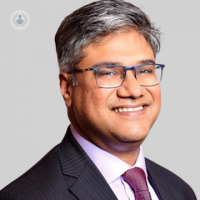Pancreatic cancer: what are the warning signs?
Written by:Pancreatic cancer is a type of cancer that many people may not have a lot of knowledge about but it is commonly occuring. Highly skilled consultant general and hepato-pancreato-biliary surgeon Mr Deepak Hariharan explains everything you need to know about this type of cancer, including warning signs and treatment.
What is pancreatic cancer?
The pancreas is a deep-seated central organ in the upper abdomen, beneath the breastbone (sternum) and it lies just in front of the spine. Its main function is to regulate the blood glucose level in the body by making insulin. It secretes enzyme-rich fluid that breaks down proteins and helps digest them.

The organ is structurally made of cells that come together to perform these functions. Once cells become abnormal (most often with age), they get deregulated to form cancer cells. These cells come together as a dysfunctional cancerous lump in the gland and as a result, pancreas cancer is formed. The most common cancer developing in the pancreas is pancreatic ductal adenocarcinoma. It affects the head of the gland in 80% of cases.
What are the early warning signs of pancreatic cancer?
Pancreatic cancer is a difficult cancer to diagnose and is biologically very aggressive. There is a lack of reliable screening tests and an absence of early warning symptoms and signs. The common symptoms associated with pancreatic cancers include weight loss, backache, reduced appetite, vomiting, early or new onset diabetes and obstructive jaundice. The presence of symptoms raises concerns for advanced disease.
Is pancreatic cancer painful?
A large proportion of patients with pancreatic cancer present with pain and often harbour advanced or inoperable disease. Early pancreatic cancer is largely silent and asymptomatic. The symptoms of early disease are subtle and often vague. Due to this, patients often ignore or self-treat symptoms before presenting to the clinician for evaluation. Awareness of the condition is vital, while old age and smoking are risk factors for developing the disease.
How is pancreatic cancer treated?
Treatment of pancreatic cancer depends on the stage of presentation and the general clinical condition of the patient, along the patient’s ability to withstand major surgery under anaesthetic.
The majority of cases present with locally advanced disease or metastases (90% of cases). This is because the development of symptoms is associated with advanced disease. In such cases, if patients are symptomatic with jaundice or are unable to eat, they will need endoscopic or radiological biliary and duodenal decompression with stents. They will also require tissue diagnosis and referral to an oncologist for chemotherapy.
There are multiple curative surgery options available. Operative procedures include:
- Whipple’s operation,
- Distal pancreatectomy/splenectomy
- Total pancreatectomy
- Central pancreatectomy
Chemotherapy after surgery (occasionally before surgery) remains the mainstay of treatment.
Surgery is possible and tailored depending on the location of tumour (head, body, tail and / or multifocal disease) in the absence of metastases and involvement of major abdominal vasculature.
The ability to have curative surgery with chemotherapy is favourable and significantly impacts survival.
What's the survival rate for pancreatic cancer?
Pancreatic cancer is an aggressive cancer, meaning that survival depends on age, general medical fitness of the patient and the stage of disease (presence or absence of metastases), as well as the patient’s ability to withstand therapy, whether it is surgery or chemotherapy.
The five-year survival approaches 40% for select cases once they have had successful surgery, alongside chemotherapy.
If you are suffering from pancreatic cancer and would like to book a consultation with Mr Hariharan, do not hesitate to do so by visiting his Top Doctors profile today.


